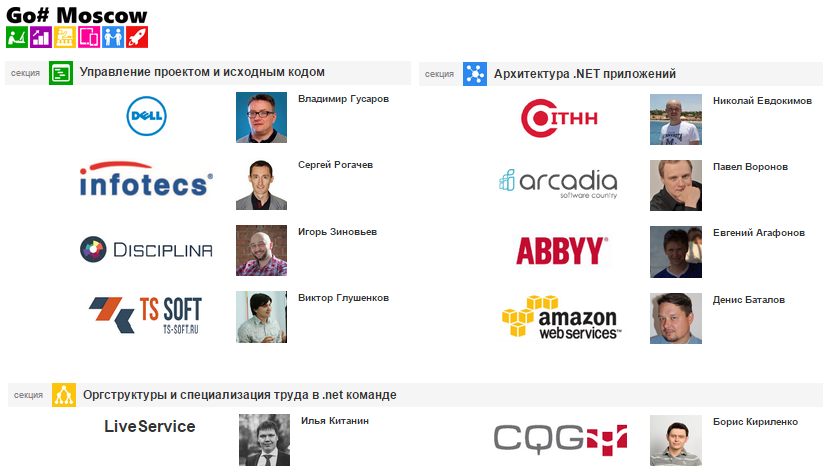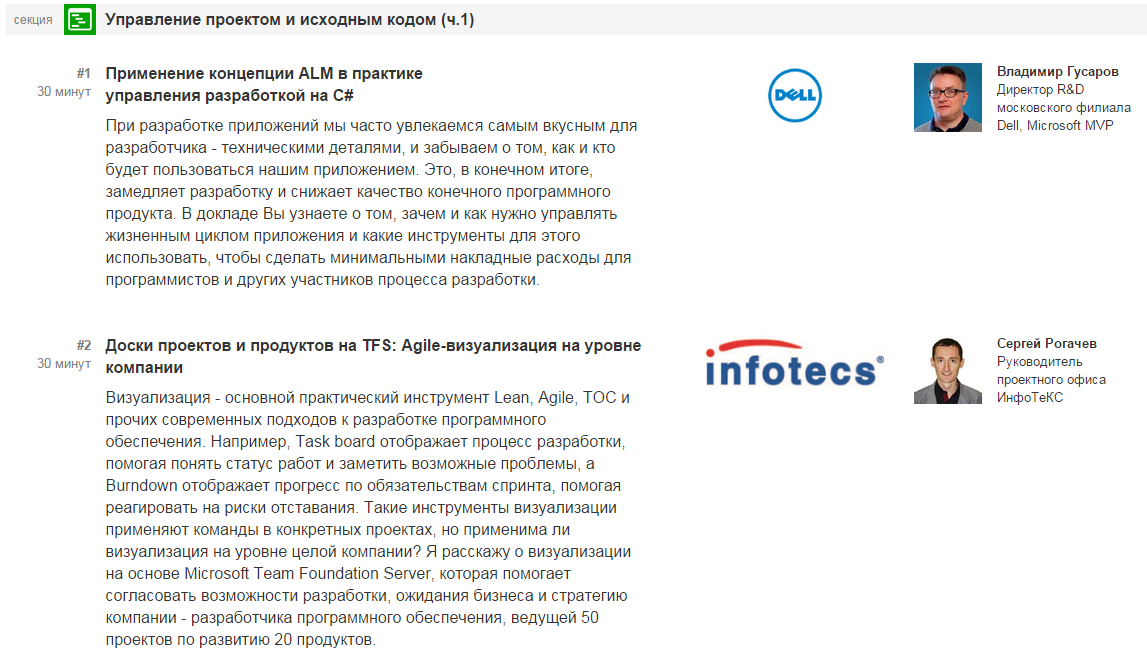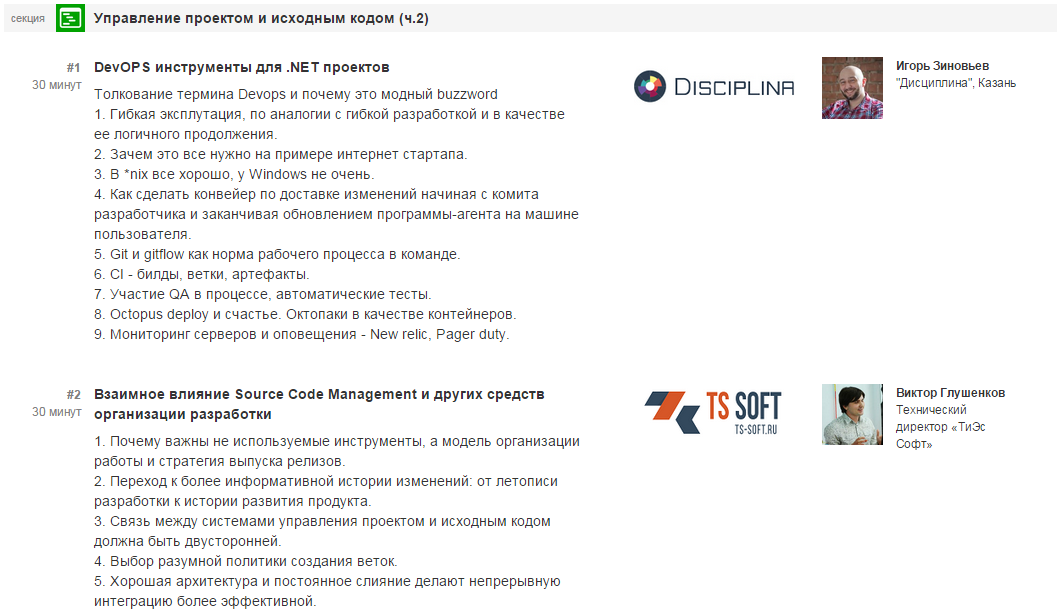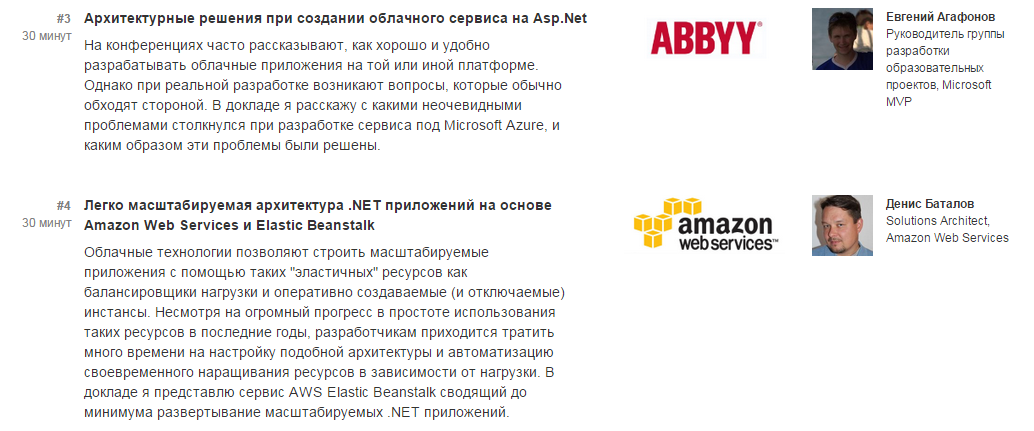What the team leader should know and how we made up the program for the second day of the Go conference
Good afternoon, readers of Habr!
At once I will say that the target audience of the post and events: leaders in the development in C # /. Net , including the leaders and project managers. And those who plan to move to a leadership position .
I will share the logic of forming the program for the second day of the Go # conference.
We took the topics that a person should have in a leadership position in the development. At the same time, the specific implementation of this knowledge should be specific for the C # /. Net ecosystem.
')
For an event with one track, the program turned out to be concentrated. The schedule includes 10 reports for 15-30 minutes, lunch in a cafe and coffee breaks - all from 10.00 to 17.00.
Topics: from the .Net application architecture to the mechanics of team building solutions and task distribution. And, of course, project and source code management. The speakers will present two polar paradigms - the classic TFS-based Application Lifecycle Management and alternative approaches using Git and DevOps tools.
Our speakers started out as C # /. Net developers, but many have experience managing teams and projects with dozens and even hundreds of developers.
Website of the Team Leader Day Go # - www.gosharp.ru/TLD2014

Many of us are programmers in the shower . And we love to write code. But leadership leaves less time for it. Even the team leader of a small team of 3 people notices. From 30 to 50% of the time is spent on external communication and team management. Managerial competencies are key to his work and growth.
What should he know? This question was discussed on Habré (for example, here , here ), but I liked the answers on the Toaster ( here ) more.
The range of required skills is quite wide - from general management skills with setting tasks and monitoring their implementation to owning development methodologies and project management tools and source code. Some of the competencies are quite universal - communication skills. And, for example, agile methodologies are common for developers of different stacks.
I would like to dwell on those areas of knowledge that, by their specificity, are tied to the .Net / C # ecosystem :
Many teams and developers have already developed their own project and source code management style. For example, now I have all .Net projects on BitBucket, I use GitExtensions as a client. And for task management I use Asana. Jira and Trello did not go at all.
I have no time to dive deep into the choice of alternatives. Let it taste things. But if a respected person in the community explains that I will benefit from switching to another tool , then I will think about it.
From reports and discussions we want to get answers to the following questions:
1. Comparison of source code control and project management. TFS vs Git.
2. What are the time and financial costs associated with each of them.
3. What is more important - the tool or how we use it.
Also interesting is the experience of speakers and participants in the following:
4. Organizational version merge management.
5. The division of repositories in the presence of contractors.
6. Project management, tasks and work items, metrics collection and monitoring.
I would like to hear advice from practitioners in the .Net environment. That all councils were applicable, but not abstract. We begin with reports related to the use of TFS.

Interestingly, when we collected reports about the practice of TFS, friends said - "Yes, we have everything differently."
To make the section not look religious, we added an alternative wing:

Why is architecture important? It is she who defines the boundaries between the blocks of the system, which can be handled by different teams and developers.
Application architecture is a very voluminous topic. We would like to discuss ways of organizing code in Solution. The need for design patterns that are used when connecting different projects and libraries. Learn about trendy things like CQRS and EventSourcing.
But the 1.5 hour section is very small. They will be rich and you will hear 4 reports.
I will give a talk “How to switch from a two-tier architecture of a Desktop application to a three-tier one in one day” . It is about how to avoid duplicate code when creating and modifying three-tier applications. When adding fields and entities, developers often perform actions that fit into a specific pattern. Sometimes such work is called “dragging the ropes”. The report is short and rather reveals several recipes, but it is precisely on the subject of architecture. Questions will be touched on how the three-tier application code is distributed across projects in Solutions and why I chose this dependency organization scheme.
Behind me there will be a short report about using Visual Studio SDK and Snippetizer. And then two complex reports from Denis Batalov from Amazon Web Services and Evgeny Agafonov from Abbyy .

Why are these two reports about the cloud, and not just about the architecture?
We constantly hear about the clouds in the brochures. But do we have time to dive in and see if we need it now? Will the transition from ordinary colocation hosting to the cloud benefit? And we are interested not in the abstract - but for our .Net projects. This is what we ask the speakers.
Disclaimer: about the format of a non-content conference ( post on Habré ), on taking into account the experience of the event ( post on Habré ).
I program for fun. And for his sake I go to events.
We do not set an impossible goal to “tell all”. But we strive to make the time of the participants pleasant and eventful.
What we don't want to do? To “strain” people with a technical report at the end of the day. Therefore, at the very beginning we put more technical and non-debatable topics - this is the “Architecture” section.
What do we want to get? Satisfied participants who chat together over lunch and afterparty.
Therefore, in the middle is an important topic for all project management and source code. And in the end, such easy-to-understand, soft and controversial topics as work organization and “where to develop a leader”.
178 people have already decided how to usefully spend December 12;) Despite our desire to accept more people, 225 people can comfortably sit on the site. Less than 50 places left, have time to register now!
Program and registration: http://gosharp.ru/TLD2014 .
We are waiting for you!
At once I will say that the target audience of the post and events: leaders in the development in C # /. Net , including the leaders and project managers. And those who plan to move to a leadership position .
I will share the logic of forming the program for the second day of the Go # conference.
We took the topics that a person should have in a leadership position in the development. At the same time, the specific implementation of this knowledge should be specific for the C # /. Net ecosystem.
')
For an event with one track, the program turned out to be concentrated. The schedule includes 10 reports for 15-30 minutes, lunch in a cafe and coffee breaks - all from 10.00 to 17.00.
Topics: from the .Net application architecture to the mechanics of team building solutions and task distribution. And, of course, project and source code management. The speakers will present two polar paradigms - the classic TFS-based Application Lifecycle Management and alternative approaches using Git and DevOps tools.
Our speakers started out as C # /. Net developers, but many have experience managing teams and projects with dozens and even hundreds of developers.
Website of the Team Leader Day Go # - www.gosharp.ru/TLD2014

What should a team leader know
Many of us are programmers in the shower . And we love to write code. But leadership leaves less time for it. Even the team leader of a small team of 3 people notices. From 30 to 50% of the time is spent on external communication and team management. Managerial competencies are key to his work and growth.
What should he know? This question was discussed on Habré (for example, here , here ), but I liked the answers on the Toaster ( here ) more.
The range of required skills is quite wide - from general management skills with setting tasks and monitoring their implementation to owning development methodologies and project management tools and source code. Some of the competencies are quite universal - communication skills. And, for example, agile methodologies are common for developers of different stacks.
I would like to dwell on those areas of knowledge that, by their specificity, are tied to the .Net / C # ecosystem :
- Project and source management. This is directly included in the duties of any team leader.
- Application architecture. It is she who defines the boundaries between the blocks of the system, which can be handled by different teams and developers.
- Labour Organization. The topic of organizational structures is well studied in business literature, but it is boring to read. We also have specific tasks - how to group developers with different combinations of skills in .Net and what to assign to whom.
Project and Source Management
Many teams and developers have already developed their own project and source code management style. For example, now I have all .Net projects on BitBucket, I use GitExtensions as a client. And for task management I use Asana. Jira and Trello did not go at all.
I have no time to dive deep into the choice of alternatives. Let it taste things. But if a respected person in the community explains that I will benefit from switching to another tool , then I will think about it.
From reports and discussions we want to get answers to the following questions:
1. Comparison of source code control and project management. TFS vs Git.
2. What are the time and financial costs associated with each of them.
3. What is more important - the tool or how we use it.
Also interesting is the experience of speakers and participants in the following:
4. Organizational version merge management.
5. The division of repositories in the presence of contractors.
6. Project management, tasks and work items, metrics collection and monitoring.
I would like to hear advice from practitioners in the .Net environment. That all councils were applicable, but not abstract. We begin with reports related to the use of TFS.
Interestingly, when we collected reports about the practice of TFS, friends said - "Yes, we have everything differently."
To make the section not look religious, we added an alternative wing:
- First, we really wanted a report on DevOps. This is now a fashion trend and I want to understand - do we need this DevOps? Does this concept have any practical advantages?
About this report Igor Zinoviev from Kazan. - Secondly, in fact, the instruments themselves are simply instruments. And it is important how we use them.
For example, it is much more important what is your work organization model and release strategy . Do you have a connection between the project management system and the source code? Is it double sided? What is your branch policy?
Answers to these questions will be heard in the report of Viktor Glushenkov .
.Net application architecture
Why is architecture important? It is she who defines the boundaries between the blocks of the system, which can be handled by different teams and developers.
Application architecture is a very voluminous topic. We would like to discuss ways of organizing code in Solution. The need for design patterns that are used when connecting different projects and libraries. Learn about trendy things like CQRS and EventSourcing.
But the 1.5 hour section is very small. They will be rich and you will hear 4 reports.
I will give a talk “How to switch from a two-tier architecture of a Desktop application to a three-tier one in one day” . It is about how to avoid duplicate code when creating and modifying three-tier applications. When adding fields and entities, developers often perform actions that fit into a specific pattern. Sometimes such work is called “dragging the ropes”. The report is short and rather reveals several recipes, but it is precisely on the subject of architecture. Questions will be touched on how the three-tier application code is distributed across projects in Solutions and why I chose this dependency organization scheme.
Behind me there will be a short report about using Visual Studio SDK and Snippetizer. And then two complex reports from Denis Batalov from Amazon Web Services and Evgeny Agafonov from Abbyy .
Why are these two reports about the cloud, and not just about the architecture?
We constantly hear about the clouds in the brochures. But do we have time to dive in and see if we need it now? Will the transition from ordinary colocation hosting to the cloud benefit? And we are interested not in the abstract - but for our .Net projects. This is what we ask the speakers.
Chronological order of the sections and enjoyment of the conference
Disclaimer: about the format of a non-content conference ( post on Habré ), on taking into account the experience of the event ( post on Habré ).
I program for fun. And for his sake I go to events.
We do not set an impossible goal to “tell all”. But we strive to make the time of the participants pleasant and eventful.
What we don't want to do? To “strain” people with a technical report at the end of the day. Therefore, at the very beginning we put more technical and non-debatable topics - this is the “Architecture” section.
What do we want to get? Satisfied participants who chat together over lunch and afterparty.
Therefore, in the middle is an important topic for all project management and source code. And in the end, such easy-to-understand, soft and controversial topics as work organization and “where to develop a leader”.
178 people have already decided how to usefully spend December 12;) Despite our desire to accept more people, 225 people can comfortably sit on the site. Less than 50 places left, have time to register now!
Program and registration: http://gosharp.ru/TLD2014 .
We are waiting for you!
Source: https://habr.com/ru/post/244577/
All Articles